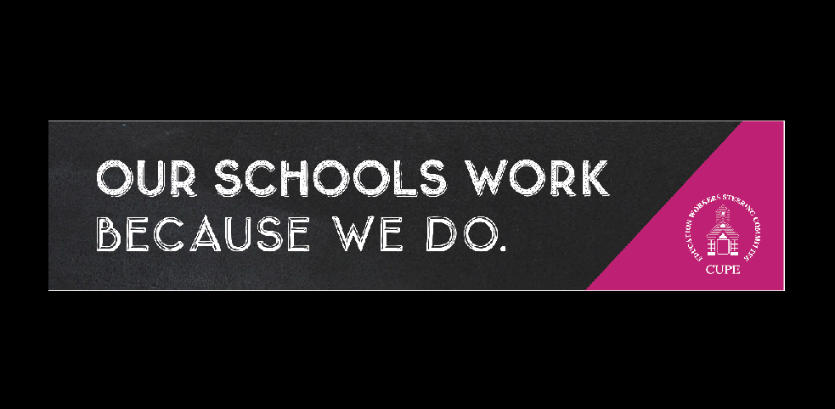THE IMPACT OF WAGE ROLLBACKS ON EDUCATION SUPPORT WORKERS
Support staff who work for school divisions earn modest wages, especially the majority of support staff who work on a ten-month basis.
Staff who work full-year include school division office staff, caretakers, and some tradespersons. Caretakers or facility operators across the province earn wages in the range of $16.55 an hour to $32 an hour for a facility technician or supervisor. Board office administrative staff earn between $20 and $26 an hour.
Ten-month employees earn significantly less because they may only work 1,100 to 1,300 hours per year.
WHAT A 3.5% WAGE ROLLBACK WOULD MEAN TO EDUCATION WORKERS
A head caretaker in Regina separate schools earns a top wage rate of $23.69 an hour, or a gross annual salary of $49,275.20. It is important to note that this is the annual salary before income tax and other payroll deductions. A 3.5% rollback would mean a loss of $1,724.63, or a salary of $47,550.57. After three additional years of no wage increases, a caretaker would experience a 9.5% loss in real wages, or $4,681.14 less in real wages.
An educational assistant in the Good Spirit School Division earns a top wage rate of $21.31 an hour, but is only scheduled to work 5.75 hours per day for 194 days. That makes a gross annual salary of $23,771.31. A 3.5% reduction in salary would mean a loss of $832 in one year, or a salary of $22,939.31. After three additional years of no increases, the purchasing power of her wage would be 9.5% less, or a real loss in purchasing power of $2,258.27.
HERE’S WHAT EDUCATION WORKERS ARE SAYING
“To me this means disrespect and that we are not playing an important role in education – not enough value to be paid adequately. I already work two jobs (12 hours a day) to make a reasonable living. I can’t possibly work more jobs as my health is being compromised. I feel that a reduction means looking for a different job.”
“It will severely affect my family. It is already hard to live off my wages with the cost of living today. It would mean my kids not being able to participate in extracurricular activities because it is already tough now to do those things.”
“I can barely afford things as it is. I basically get $1,100 dollars a month. How much could you pay for with that amount a month?”
“It would mean I would, in the end, not be making anything by the time I would pay my child care bill. Would not leave much of a paycheque for anything else.”
“It would impact me and my family greatly! My family couldn’t continue to meet our monthly budget if I had a wage rollback. I would need to seek employment elsewhere. Currently I am working more than one job so I couldn’t manage a wage cut.”
“Already within the last year, I have had 15 minutes per day cut out. If the wage is decreased, it will mean that I will have a lot of thinking to do about whether I want to continue at this position. As a larger family I don’t know if we can survive another pay cut.”
“I would have to give up everything. As a single mom with three kids, there would be no extras at all. The government would need to subsidize my living.”
“As the only income in family, we live paycheque to paycheque, so savings will be non-existent. Things that we put off for later now may have to be put off indefinitely. Simple things like eye exams, dental care, minor car repairs will become large hurdles that we may not be able to conquer.”
“Already had to sell my house because I could not afford it.”
“I’m going to incur more debt because I am already stretched to the limit. I’m only one cheque away from bankruptcy if any more job cuts happen.”


